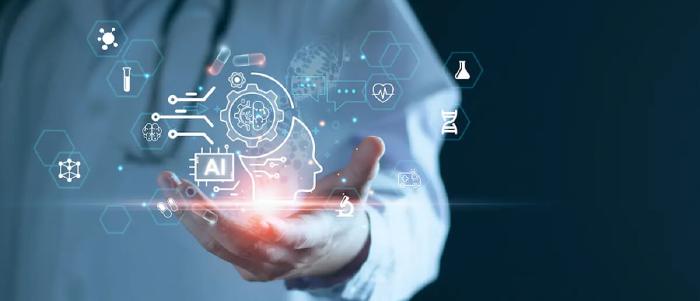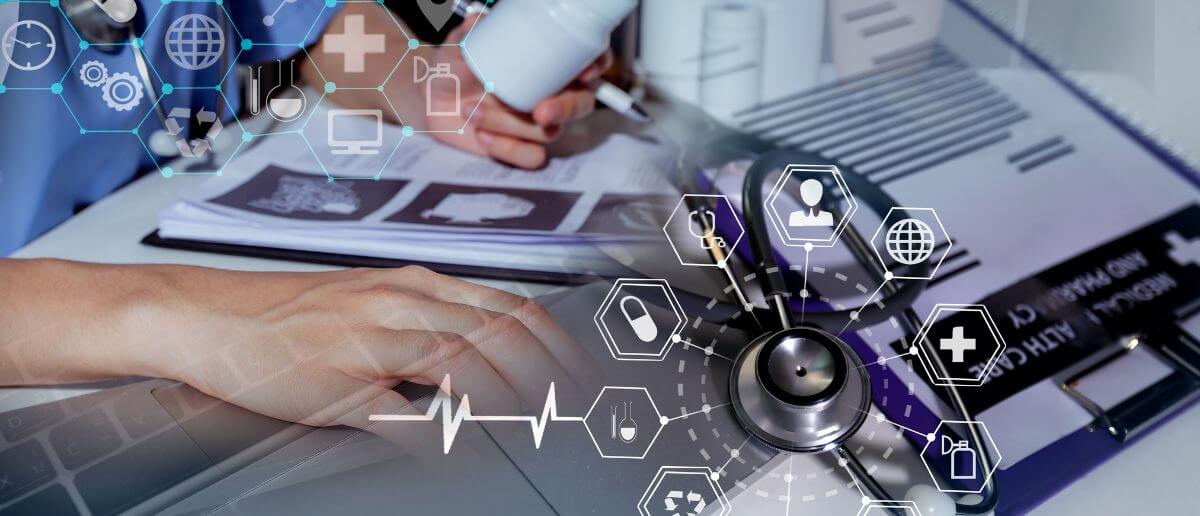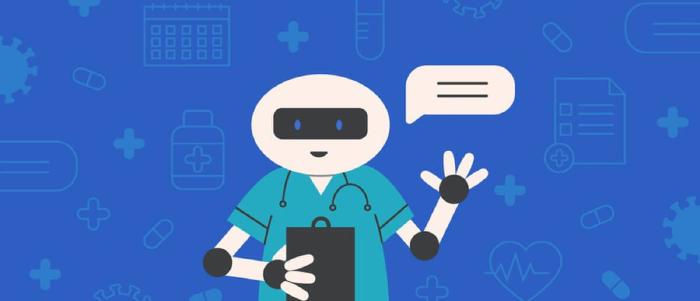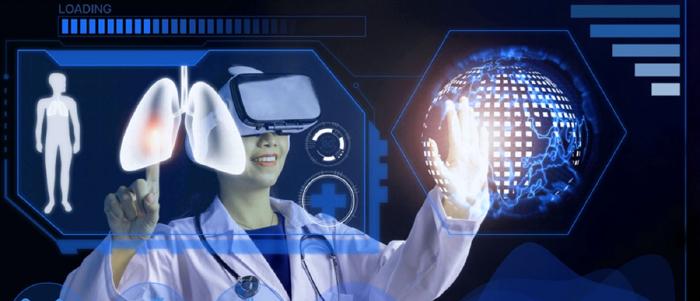
December 9 2023
8 min read

Nov
Imagine a machine that can create something entirely new, like a picture, a melody, or even a medical diagnosis. This is the power of generative AI, a type of artificial intelligence that uses complex algorithms to generate new data based on what it has learned.
Think of it like a chef who learns from countless recipes and then comes up with his own unique dishes. That’s what generative AI does. It analyzes existing data, like medical records, images, and scientific research, and uses that knowledge to generate innovative solutions, like personalized treatment plans or even new drugs.
Healthcare is a complex and challenging field, facing issues like:
Outdated systems and workflows: Many healthcare systems still rely on paper records and inefficient processes, slowing down care and increasing errors.
Lack of access to specialists: Many patients, especially those in remote areas, struggle to access specialized care.
High costs and limited resources: Healthcare systems are often underfunded, leading to limited access to care and expensive treatments.
Generative AI has the potential to address these challenges and revolutionize healthcare. It can:
Personalize medicine: By analyzing an individual’s genetic makeup and medical history, generative AI can predict disease risk and tailor treatment plans to their specific needs.
Improve diagnostics: AI can analyze medical images and data to detect diseases earlier and more accurately, leading to better outcomes.
Streamline operations: AI can automate administrative tasks, freeing up time for doctors and nurses to focus on patient care.
Reduce costs: By improving efficiency and preventing unnecessary tests and procedures, generative AI can help to reduce healthcare costs.
In short, generative AI has the potential to make healthcare more accessible, affordable, and effective for everyone.
Imagine a world where your doctor could predict your risk of developing specific diseases based on your unique genetic makeup and then tailor a treatment plan to prevent them. This is the promise of personalized medicine, and generative AI is playing a key role in making it a reality.
Here are some ways generative AI is transforming personalized medicine:
Genetic analysis: AI can analyze your genes to identify mutations that increase your risk of certain diseases, allowing for early detection and intervention.
Drug discovery: AI can help researchers design new drugs that are more effective and have fewer side effects by predicting how they will interact with your individual genetic profile.
Treatment planning: AI can analyze your medical history and other factors to recommend the most effective treatment for your specific condition.
Medical imaging technologies like X-rays, MRIs, and CT scans play a crucial role in diagnosis and treatment. However, interpreting these images can be time-consuming and require specialized expertise. Generative AI is helping to overcome these challenges by:
Generating synthetic medical images: AI can create realistic simulations of various medical conditions, allowing doctors to train their skills and improve their diagnostic accuracy.
Automating image analysis: AI can automatically detect anomalies in medical images, such as tumors or fractures, helping doctors identify potential problems faster and more efficiently.
Developing new drugs is a long and expensive process, often taking years and billions of dollars. Generative AI is helping to streamline this process by:
Identifying promising drug candidates: AI can analyze vast amounts of data to identify molecules with potential therapeutic benefits, allowing researchers to focus their efforts on the most promising leads.
Optimizing clinical trial design: AI can help to design more efficient and effective clinical trials, leading to faster drug development and approval.
By transforming diagnostics, treatment, and drug discovery, generative AI is paving the way for a future where healthcare is more personalized, accurate, and effective.
Healthcare providers spend a significant amount of time on administrative tasks, such as paperwork and billing, taking away from the time they can spend with patients. Generative AI can help to streamline these tasks by:
Generating personalized reports and summaries: AI can process complex data and medical records to create concise summaries for both patients and providers, improving communication and understanding.
Automating insurance claims processing and prior authorization: AI can automate the tedious process of submitting and tracking insurance claims, freeing up staff time and reducing administrative costs.
Chatbots and virtual assistants: AI-powered chatbots and virtual assistants can answer patient questions, schedule appointments, and handle other routine tasks, reducing the workload on healthcare staff and improving patient satisfaction.
Patient education is crucial for effective healthcare. However, traditional methods, such as brochures and pamphlets, may not be engaging or personalized enough. Generative AI can personalize patient education by:
Creating tailored educational materials: AI can analyze individual patient data and needs to generate personalized learning modules, videos, and other resources that are more relevant and engaging.
Facilitating communication and engagement: AI-powered chatbots and virtual assistants can answer patient questions about their conditions, treatment options, and medications, leading to better understanding and treatment adherence.
By streamlining administrative tasks and personalizing patient education, generative AI can help to improve patient care and satisfaction, while also reducing costs and improving workflow efficiency.
Generative AI models are only as good as the data they are trained on. If the training data is biased, the AI model will also be biased, potentially leading to unfair and discriminatory outcomes in healthcare. To address this issue, it is crucial to:
Use diverse and representative datasets: AI models should be trained on datasets that reflect the diversity of the population they are intended to serve.
Develop and implement methods for bias detection and mitigation: Techniques like data augmentation and algorithmic fairness testing can help to identify and mitigate biases in AI models.
Transparency and explainability: Explainable AI techniques can help to understand how AI models arrive at their decisions, promoting transparency and accountability.
Healthcare data is highly sensitive and personal. It is crucial to ensure that this data is protected from unauthorized access, use, or disclosure. This requires:
Strict adherence to data privacy regulations: Healthcare organizations must comply with regulations like HIPAA and GDPR to safeguard patient data.
Robust data security measures: Implementing strong cybersecurity measures, such as encryption and access controls, is essential to protect against data breaches.
Patient consent and control: Patients should have control over their data and be informed about how it is being used.
The regulatory landscape for AI in healthcare is still evolving. It is essential to develop regulations that encourage innovation while ensuring patient safety and ethics. This requires:
Collaboration between regulators, healthcare providers, and technology companies: Open dialogue and collaboration are crucial to develop effective and adaptable regulations.
Risk-based approach to regulation: Regulatory frameworks should be based on the risks associated with different AI applications.
Focus on transparency and accountability: Regulations should promote transparency in AI development and deployment, holding developers and users accountable for their actions.
By addressing ethical considerations and navigating the regulatory landscape responsibly, we can ensure that generative AI is used safely and ethically in healthcare, benefiting patients and society as a whole.
The field of generative AI in healthcare is rapidly evolving, with new applications and innovations emerging constantly. Some exciting trends include:
AI-powered virtual assistants and chatbots: These AI-powered tools can provide patients with 24/7 access to information and support, answer questions, and even offer basic medical advice.
Generative AI for mental health and behavioral health: AI can be used to personalize therapy sessions, provide cognitive behavioral therapy, and even diagnose mental health conditions.
The potential of AI in personalized surgery and rehabilitation: AI can be used to design custom surgical plans, guide robotic surgery, and personalize rehabilitation programs.
Med-PaLM-2 is a cutting-edge generative AI model developed by Google specifically for healthcare applications. It has achieved state-of-the-art results in various tasks, including:
Answering complex medical questions: Med-PaLM-2 can accurately answer a wide range of medical questions, even those that are open ended or challenging.
Summarizing medical research: Med-PaLM-2 can analyze and summarize dense medical texts, making it easier for healthcare professionals to stay up-to-date on the latest research.
Generating personalized treatment plans: Med-PaLM-2 can analyze patient data and medical history to generate personalized treatment recommendations.
Med-PaLM-2 represents a significant leap forward in healthcare AI and has the potential to revolutionize the way we diagnose, treat, and manage diseases.
Despite the promise of generative AI, there are still challenges to overcome, including:
Gaining trust and acceptance: Healthcare providers and patients need to be aware of the potential benefits and risks of generative AI before they can fully embrace it.
Addressing the skills gap: There is a growing demand for professionals with expertise in AI and healthcare, requiring investments in education and training.
Collaborations for success: Collaboration between healthcare providers, researchers, and technology companies is essential to develop and deploy AI solutions that are safe, effective, and accessible to all.
Generative AI is like a powerful tool that can change healthcare for the better. It can help us personalize medicine, make diagnoses more accurate, and improve the way hospitals work. This technology has the potential to make healthcare more accessible and affordable for everyone. If we use generative AI responsibly and ethically, it can help us create a future where everyone has access to the healthcare they need.

December 9 2023
8 min read

December 4 2023
8 min read

November 22 2023
8 min read

November 13 2023
8 min read